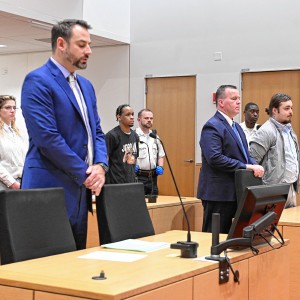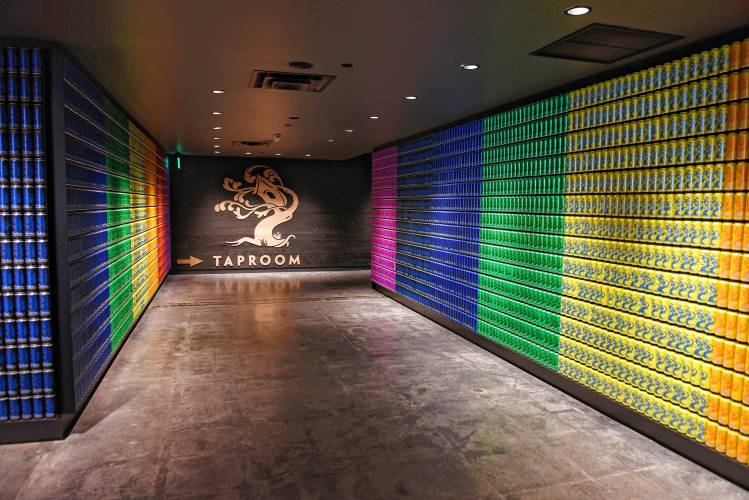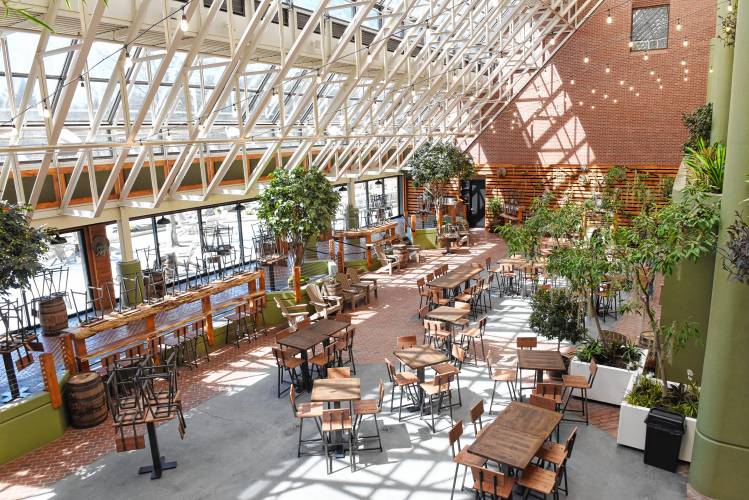Tree House shareholder files suit alleging ‘excessive salaries’ and ‘concealed investments’
| Published: 11-21-2023 7:37 PM |
SPRINGFIELD — A civil lawsuit filed in Hampden County Superior Court by a minority shareholder of Tree House Brewing Co. alleges the company’s two majority shareholders paid themselves “excessive” salaries, secretly invested in real estate and caused the plaintiff to suffer “financial harm.”
Eric Granger, a Monson resident and 2% shareholder in the company, filed the civil lawsuit on Nov. 15 alleging majority shareholders Nathan Lanier and Damien Goudreau committed several breaches of “fiduciary duty” against fellow shareholders and the rapidly growing brewery itself. Lanier and Goudreau are the company co-founders and each own 49% of the company.
In documents filed by Palmer-based attorney Geoffrey Farrington, who is representing Granger, Lanier and Goudreau are alleged to have declined to hold minority shareholder meetings and provide financial documentation to Granger, investing more than $13 million of real estate under two joint limited liability companies without disclosing it to fellow shareholders and withholding tax documentation from Granger.
“Despite Tree House’s impressive and sustained financial performance, Lanier and Goudreau continue to deprive Granger and, in the past, former minority shareholders, from enjoying any real financial benefit from their ownership state, including historical refusal to issue dividends to shareholders,” Granger’s lawsuit reads. “As a direct and proximate cause of the conduct of Lanier and Goudreau, Tree House and Granger have suffered equitable and financial damages.”
A voicemail left with Tree House’s corporate attorney was not returned by press time on Tuesday.
Granger is seeking for Lanier and Goudreau to be “compelled to account for all money and property which has come into the hands of Lanier and Goudreau from Jan. 1, 2016 through present;” return wrongly appropriated funds; and be issued orders preventing them from selling, transferring or encumbering any real estate affecting the business, retroactive dividend issuance, personal damages and the payment of court fees.
The growing beer company has seen massive success in recent years, including the establishment of a Deerfield location and summer concert stage at 1 Community Place; a Woodstock, Connecticut location; and the announcement of a new location in Saratoga Springs, New York.
In Massachusetts alone, Tree House has had an estimated $143 million in economic impact, with the Deerfield location representing $26 million of that amount, according to a study from the University of Massachusetts Amherst’s Donahue Institute that was shared by the brewery.
Article continues after...
Yesterday's Most Read Articles
 Greenfield homicide victim to be memorialized in Pittsfield
Greenfield homicide victim to be memorialized in Pittsfield
 Former Greenfield man granted new trial after 1995 murder conviction, walks free
Former Greenfield man granted new trial after 1995 murder conviction, walks free
 On The Ridge with Joe Judd: What time should you turkey hunt?
On The Ridge with Joe Judd: What time should you turkey hunt?
 Judge sets bail for Millers Falls assault suspects
Judge sets bail for Millers Falls assault suspects
 Franklin Tech student welds artistic bench for French King Bridge
Franklin Tech student welds artistic bench for French King Bridge
 As I See It: Between Israel and Palestine: Which side should we be on, and why?
As I See It: Between Israel and Palestine: Which side should we be on, and why?
A chief complaint in the lawsuit is alleged concealment of real estate and other holdings. Granger alleges Lanier and Goudreau established the limited liability companies Landreau Realty and Pride and Purpose in 2016 and 2018, respectively, “without disclosing” them to the remaining shareholders of Tree House, while also leasing some of the LLCs’ properties to Tree House, including a single-family, beachfront home in Sandwich that is adjacent to Tree House’s facility there.
These real estate holdings, Granger’s complaint adds, have been “valued at over $13 million without offering any opportunity to Tree House or its shareholders prior to acquisition of same,” with the two real estate companies receiving nearly $10 million in payments, according to the lawsuit.
Since Lanier and Goudreau were served a shareholder derivative demand letter in September 2022, the lawsuit states the two have “agreed to transfer their ownership interest in Landreau Realty LLC and Pride and Purpose LLC, and all assets of same, to Tree House.”
“The lease payments to Landreau Realty LLC and Pride and Purpose LLC were and are above market value and did not serve any legitimate business purpose,” the lawsuit states. “All improvements to the land only benefited Lanier and Goudreau, not Tree House. The leases were created to divert corporate assets from Tree House … for the benefit of only Lanier and Goudreau, and to the detriment of the remaining shareholders of Tree House.”
Granger also alleges he was misled during the formation of Tree House’s corporation because he was never told that his membership interest in the limited liability company would be converted to a Class B, non-voting stock, while Lanier and Goudreau were the only shareholders to receive Class A status, which gave them “complete control at the expense of the other shareholders.”
While applying for licenses at its Deerfield location, the company, according to the lawsuit, requested Granger execute a new Criminal Offender Record Information (CORI) request form because the state’s Alcoholic Beverage Control Commission needed updated documents.
In response to the request, Granger asked for information about the Deerfield location’s pouring permit and the purpose of using his CORI form. His complaint states Tree House never responded, and instead “unilaterally and without permission changed the ‘location’ address” on his 2017 form and submitted the “altered document” without his permission. Granger then said the company did the same thing for its Sandwich location.
Granger filed a complaint with the Massachusetts Alcoholic Beverage Control Commission in June of this year, which resulted in a Sept. 6 “written warning to Tree House for their mishandling of company documents.”
Other complaints in the lawsuit include a “pattern and practice of paying excessive officer salaries and bonuses to themselves” and Dean Rohan, another former minority shareholder and employee of Tree House, while “not issuing any dividends to the other minority shareholders.” From 2017 through 2020, Granger’s complaint states officer salaries and bonuses “exceeded $4 million all while depriving minority shareholders of any dividend distributions.”
A pretrial hearing in the case has yet to be scheduled.
Chris Larabee can be reached at clarabee@recorder.com.




 1989 homicide victim found in Warwick ID’d through genetic testing
1989 homicide victim found in Warwick ID’d through genetic testing ‘Stand up for our democracy’: Voting rights activist John Bonifaz keynote speaker during Law Day event
‘Stand up for our democracy’: Voting rights activist John Bonifaz keynote speaker during Law Day event Doors open at Tilton Library’s temporary home at South Deerfield Congregational Church
Doors open at Tilton Library’s temporary home at South Deerfield Congregational Church DA to announce breakthrough in 1989 unsolved homicide in Warwick
DA to announce breakthrough in 1989 unsolved homicide in Warwick
